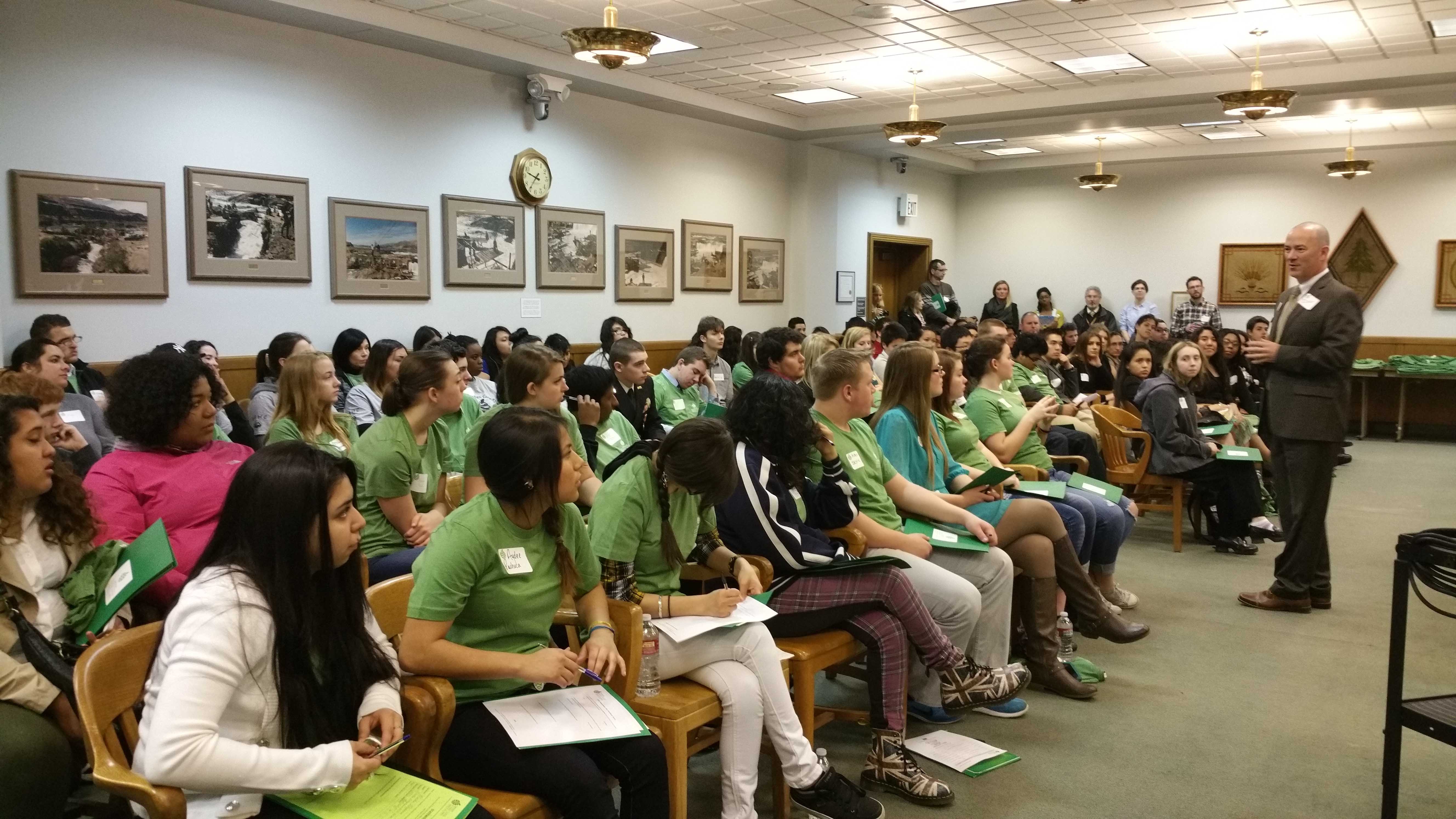10 July 2015 By Maureen Hinman
 Legislative successes for SBHCs
Legislative successes for SBHCs
Sine die, the official end of the 2015 legislative session was Monday, July 6. As the membership organization and nonprofit advocate for school-based health centers (SBHCs) in Oregon, OSBHA worked hard throughout the session to increase funding for SBHCs, and we were rewarded for our effort!Senate Bill 5507 is a large budget bill, sometimes referred to as the Christmas Tree Bill, that was passed at the very end of session and included funding for SBHCs. OSBHA’s advocacy resulted in our partners at the State SBHC Program Office (SPO) seeing a budget increase of $600,000 to support current planning sites that will open in the next two years into the funding formula and to increase the amount that counties with more than one SBHC receive for each county.
Additionally, $10 million in one-time funds was allocated for grants for safety net providers, specifically including SBHCs, through the Safety Net Capacity Grant Program. This was in response to a bill that was put forward by the Oregon Latino Health Coalition and on which OSBHA actively partnered to ensure that the Oregon Health Authority (OHA) would be able to serve the more than 17,000 children and youth that are still categorically excluded from health services.
Mental health funding overall was increased this session and for SBHCs and increased from $4.4 million in the 2013-2015 biennium to $6.4 million in the 2015-2017 biennium. This means that existing SBHC mental health grants will remain in place and sites that recently opened and applied for mental health grants will also be able to receive funding. Counties set to receive funding should have received an informal notification of their award status in June. There will be 52 SBHCs receiving funding through the Mental Health Expansion Grants this biennium.
Capital construction funds will become available, but must be in conjunction in with the school district. A total of $126 million for the biennium was allocated from general obligation bonds for this purpose. The Oregon Department of Education will administer grants for capital costs including construction, improvement, remodeling, equipment purchase, maintenance, and repair of a school district building. This can include SBHCs. School districts must match the state grant with funds from local voter approved bonds. The size of the grant must be between $4 million and $8 million. Sixty percent of the grants are based on a priority list and 40 percent is on a first-come, first-served basis.
Senate Bill 902 encourages Coordinated Care Organizations to develop a plan within their Community Health Needs Assessments that includes a strategy to work with children’s programs to integrate services for students and identify best practices in school-based health care (SBHC) systems or services.
Thank you
OSBHA would like to thank the many legislators from both sides of the aisle that supported SBHCs. And we especially want to highlight Senator Laurie Monnes Anderson, Senator Elizabeth Steiner Hayward, Representative Nancy Nathanson, and Representative Alissa Keny-Guyer. These legislators have been consistent champions of kids’ health and we appreciate all of their work.We would also like to thank all of the adult and youth advocates in the SBHC community as well as partners that wrote letters, called legislators, and testified in hearings. This win is a community effort!
But, we are not done yet. OSBHA will return to the legislature in February to continue to work to improve health and educational opportunities of Oregon’s children and youth through expanded SBHC funding.
We will make more information available as legislation is adopted and implemented by the Oregon Health Authority. In the meantime, if you have questions contact Maureen Hinman.

How we work
OSBHA not only works with legislators but we also work with many partners around the state, including OHA, coordinated care organizations, education leaders, youth advocates, community-based partners, and local SBHCs. Your membership and contributions make our advocacy efforts possible and are a direct form of support for the health and academic success of Oregon's young people.Please consider financial contributions in the form of membership or donations, or sponsorship of our annual school health conference this October.
Other legislation of interest
School Health and Equity ProgramsSenate Bill 698 funds a School Nurse Task Force that will include OSBHA to examine funding for school health services. Creates position of State School Nursing Consultant, as well as support staff in the Oregon Health Authority to coordinate school nursing with public health, provide clinical consultation, and data collection and analysis.
Senate Bill 5507: The Farm to School and School Gardens program received a budget increase of $3.3 million for school districts to purchase local foods and for food-based education programs run by school districts, non-profit partners, or commodity commissions.
House Bill 5016 lays out the Oregon Department of Education budget and included $1.7 million for a school attendance pilot project to work with schools serving large populations of Native American students in order to decrease chronic absenteeism and $3 million to develop an education plan for children of color who are economically disadvantaged and experience a significant achievement gap.
House Bill 2972 requires public school students seven years of age or younger who are beginning an educational program to have a dental screening.
Senate Bill 660 requires OHA to ensure availability of dental sealant programs in elementary and middle schools with at least 40% of kids having eligibility for lunch assistance.
Public Health
Senate Bill 478: The Toxic Free Kids Act regulates toxic chemicals in children's products.
House Bill 2546: E-cigs can no longer be sold to minors or smoked in cars with minors. Additionally, they are now included in the indoor clean air act, as are cannabinoids (marijuana).
House Bill 3100 changes the governmental framework for conducting public health activities and for providing public health services in Oregon.
Senate Bill 5507 instructs OHA to conduct community meetings across the state to capture, understand, and report to the Legislature on the experience of children, adolescents, and adults experiencing mental illness and their ability to access timely and appropriate medical, mental health and human services to support their success in the community. The focus will be on the entirety of the Oregon mental health system, both public and private.
Health Practice
House Bill 2024 directs OHA, in consultation with coordinated care organizations and dental care organizations, to adopt rules and procedures for training and certifying traditional health workers to provide oral disease prevention services.
Senate Bill 832 requires OHA to establish standards for integrating behavioral health services and physical health services in patient centered primary care homes and behavioral health homes. It also allows for the use of mental health billing codes for the integration of those services and requires OHA to reimburse for those services.
House Bill 3396 creates a Healthcare Provider Incentive Fund to replace the primary loan repayment and forgiveness programs for rural health providers, effective 2018.
SB 547 creates nurse emeritus license to permit certain retired nurses to engage in volunteer practice of nursing.

